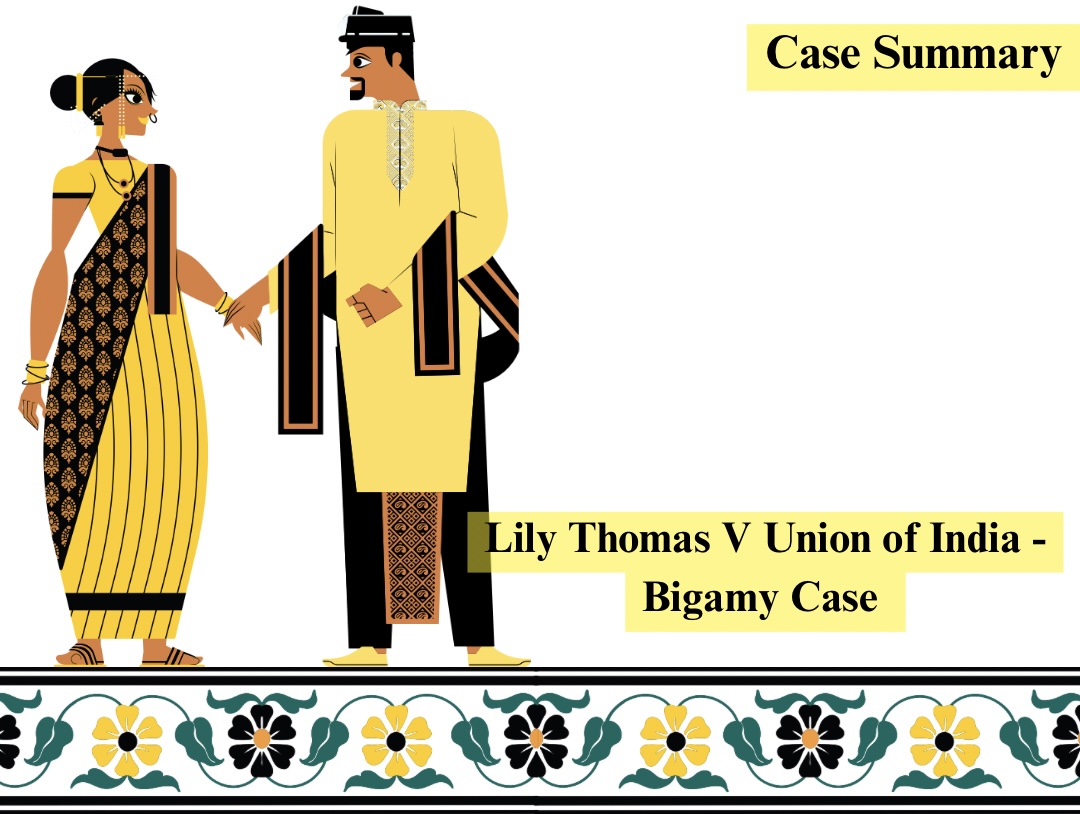
Read Time:3 Minute, 50 Second
Lily Thomas V UOI
AIR 2000 SC 1650 : 2000 Cr LJ 2433 : 2000 AIR SCW 1760 : 2000 (1) BLJ 53
Brief
Brief
Citation : AIR 2000 SC 1650 : 2000 Cr LJ 2433 : 2000 AIR SCW 1760 : 2000 (1) BLJ 53
Court : The Supreme Court of India
Date of Decision : 5 May 2000
Judges : RP Sethi and S Saghir Ahmad, JJ
Facts of the case
Facts
- The facts of the case are as follows. Sushmita Ghosh was the wife of G.C Ghosh as known as Mohd. Karim Ghazi, Sushmita Ghosh filed a writ petition in the Apex Court stating that she was married to G.C Ghosh in accordance to the Hindu rituals in the year 1984 after which they both were blissfully living together in Delhi.
- Sushmita Ghosh prayed before the Hon’ble Supreme Court as follows:
- An appropriate writ, direction or order which will declare polygamy marriages by Hindus and non-Hindus after conversion to Islam religion as void and illegal.
- To issue appropriate directions to the respondent No 1 and No 2 to carry out suitable amendments in the Hindu Marriage Act, 1955 in order to forbid and curtail the practice of polygamy.
- To issue an appropriate direction which will declare that where a non-Muslim male gets converted to Muslim faith without any real change of belief but merely with an view to avoid an earlier marriage or to enter into a second marriage, any such marriages entered into by him after such conversion would be void.
- To issue an appropriate direction to the respondent No 3 to restrain him from entering into any marriage with Vanita Gupta or any other woman during the subsistence of his marriage with the petitioner Sushmita Ghosh.
- To pass such an order and further order or orders as the Hon’ble Supreme Court may deem fit under the facts and circumstances.
Issues of the case
Issue
- Whether the conversion of a Hindu to Islam on his contracting into a second marriage violates the freedom of religion.
- Can a Hindu male be permitted to enter into another marriage after converting to Islam.
- Would a Hindu male be held to be liable for the offence of Bigamy according to Section 494 of the Indian Penal Code, 1860.
Held
Held
- In this case it was held that making a convert Hindu who has taken a second wife after conversion liable for prosecution under Section 494 of the Indian Penal Code is not against Islam and the religion adopted by such a person upon conversion. To say that it would be against Islam demonstrates the ignorance about the tenets of Islam and its teachings.
- The concept of Muslim law is passed upon the edifice of shariat, the Muslim law as traditionally interpreted and applied in India permits more than one marriage during the subsistence of one and another though capacity to do justice between co-wives in law is condition precedent.
- Even under the Muslim law plurality of marriage is not unconstitutionally conferred upon the husband. As it would therefore be doing injustice to Islamic law to urge that the convert is entitled to practice Bigamy notwithstanding the continuance of his marriage under the law to which he belonged before such conversion.
- The violators of law who have contracted the second marriage cannot be permitted to urge that such marriage should not be made subject matter of prosecution under the penal law prevalent in the country.
Judgement Analysis
Judgement
- If a Hindu converts his religion to convene a second marriage with no actual intention to genuinely profess such religion but with the intention to achieve an ulterior motive then such a second marriage is null and void as it violative of Article 21. The first marriage is not dissolved simply because either party converts.
- particularly if the first marriage is still in force then such an action would constitute to Bigamy under Section 17 of the Hindu Marriage Act, 1955. It shall invite the provisions of the Indian Penal Code such as Section 494 and Section 495. Marriages in India are performed in accordance to the provisions provided in the personal laws as applicable to the parties. A mere conversion does not dissolve a marriage until a divorce decree is obtained from the competent court and until the decree is obtained the marriage remains valid.







